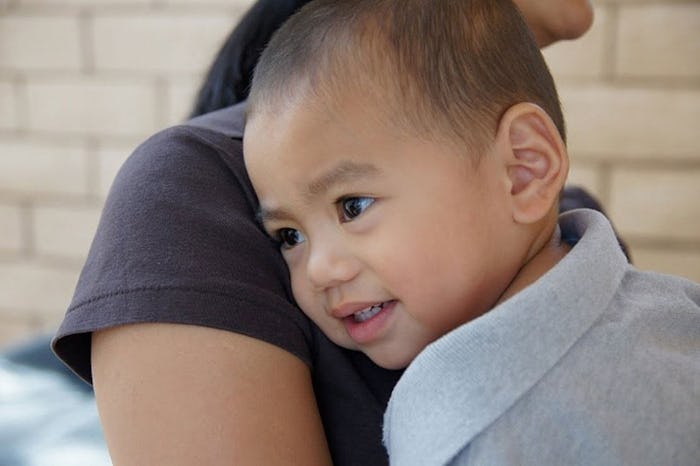There are a lot of things to figure out when you're pregnant. Will you be purchasing a baby carrier? Are you going to breastfeed? What kind of sleeping arrangement do you want for your baby? When you consider these questions, you may find that a lot of your research is directed towards attachment parenting and the principles of it. But what is attachment parenting? Aren't all parents attached to their babies or is there some kind of detail missing here?
According to Attachment Parenting International, attachment parenting is an application of sensitive responsive parenting. This type of parenting is supposed to be rooted in nurturing methods in order to create a strong emotional bond and attachment between parent and child. It's all about encouraged responsiveness to your child — when your child needs you, you respond. No crying it out or leaving baby to sit in a playpen when they want to be held. The idea behind attachment parenting is that as you respond to your child's needs, they become trusting and have healthier relationships as they grow, ones that are secure, empathetic, and comforting.
Dr. Sears noted that attachment parenting is actually pretty instinctive. You most likely have already put some of the principles in use and while attachment parenting has definite principles and guidelines, Dr. Sears insisted that it isn't a strict, rule-abiding practice. Instead, the website suggested that you think of attachment parenting as an approach instead of a strict set of rules so you can adapt to fit your baby's needs.
Although it gets a lot of interest now, Psychology Today noted that attachment parenting is not some kind of new phenomenon. It is based on "attachment theory" which is a widely-accepted theory that emphasizes the nature of the relationship between a child and their caregiver and/or parent. Observations were made in World War II that children who had been orphaned or separated from their parents had impaired physical, psychological, and social developments and the theory of attachment between a child and parent and how it affected a child's development was born.
In short, attachment parenting is "child-centered" rather than "parent-centered" according to Psychology Today. It's all about reading your baby's cues and responding to their needs so you create a safe haven for them.
Sounds like something all parents should do, right? Remember, this method of parenting is pretty instinctive and you're most likely following the principles. According to Attachment Parenting International, there are eight principles of attachment parenting — preparing for pregnancy, birth, and parenting, feeding with love and respect, responding with sensitivity, using nurturing touch, ensuring safe sleep (physically and emotionally), providing consistent and loving care, practicing positive discipline, and striving for balance in your personal and family life.
But does it mean you have to co-sleep? Does it mean you have to breastfeed on demand, 24/7? Does it mean you have to carry your baby with you everywhere you go? No. Attachment parenting is just about being responsive to your child. When your baby needs you at night, you go to them. When they are hungry, you feed them. When they need a hug or a cuddle, you take the time to make it happen.
Just like Psychology Today noted, it's a pretty practical and sensible way to raise a child. In fact, it's worth noting that attachment parenting is able to alleviate some stress from both parents and children. As your children become more secure, they are less likely to throw tantrums, to cry when you leave, or to become sick.
Leave the hardcore guidelines out of it — they don't truly exist. When you look at attachment parenting as a scientific observation, it sounds even more natural than you think.
